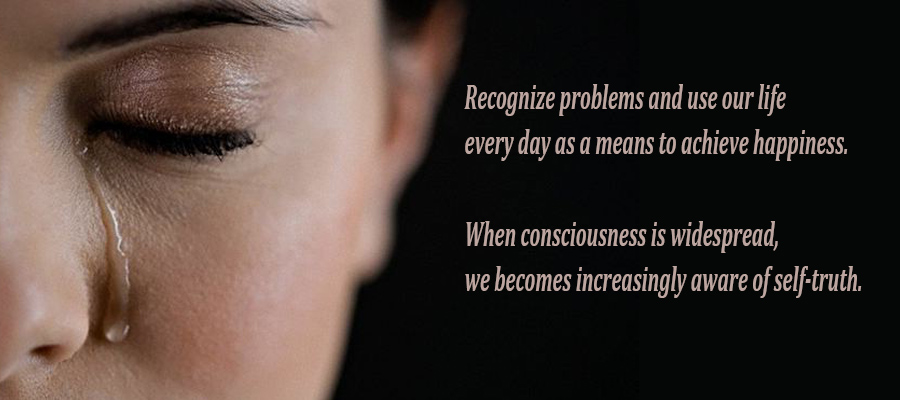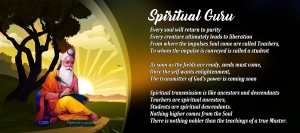From time immemorial, mankind has searched for a way out of suffering and difficulties in order to find happiness. This is a natural trend present in everyone because none of us want to suffer, none of us want to be in pain and none of us want to face difficulties. We all want to find balance, harmony, peace and happiness. Only the saints face suffering willingly because it is in suffering we remember God more. The rest of us don’t want to face these onslaughts of life and so the traditions, philosophies and religions of the world have tried to find a way for humanity to face suffering.
One of the main systems Samkhya, states that we have to face three types of suffering: personal, social and cosmic.
- Personal suffering is related to the programs in our mind and to our own personal fear, guilt, and shame, to the anxiety we face, to the complexes within us that create tension, and to our worries. It is related to our stress levels. It is on a personal level. So personal suffering relates to our body, mind, and emotions.
- Social suffering is related to other people. We experience and confront it from those who hurt us, intimidate us or threaten us. It also relates to the animal kingdom. If an animal threatens us, we feel this type of anxiety, tension or suffering. It is also experienced when someone abandons us. Social suffering is related more to the experiences we have from the world around us, from other people, or from another kingdom of nature.
- Cosmic suffering, of course, we can do nothing about, in the same way as we are helpless before fires, earthquakes, floods, and storms.
Great thinkers, philosophers and the founders of different religions and traditions have all tried to find answers for the suffering that is an inevitable part of the human experience. Buddha sought the answer to why we have to suffer, and what is the cause of suffering, and his philosophy stemmed from the answers he found.
Vedanta tried to find an answer to the suffering of the world by saying that only the Self is real. God alone exists. Everything else is unreal, and the secret of life is to realise that. Just as in a mirror you can only see your reflection, not yourself, in the same way, the world we live in is a dream; it is the reflection, not the reality; it is a mental concept. That is one way of trying to help people out of this predicament of facing pain and suffering.
Tantra believes that the purpose behind the pain, trials and tribulations of life is to explore and awaken one’s dormant potential and to stretch the mind and liberate its energy. Tantra recommends confronting a problem head-on within oneself. It also teaches that one should not confront the mind of another person.
Yoga also starts from this point and tries to find harmony and unity between our inner and outer life. Yoga helps us come to terms with what is inside us and to use what we already have inside us to live our external life creatively. At the same time, we do yoga practices to improve our skills and our inner world, so that our interactions in the outer world can become more creative and beneficial to the society we live in.
In the yogic lifestyle, there are four important points to consider: practice, awareness, attitude, and action. These are the four steps to spiritualize our lifestyle and balance our inner life with our outer life. They help us to have faith in the difficult moments of our life.
Practice and sadhana
Practice means our own personal sadhana. When we are living in an ashram it is not so necessary to have a personal sadhana because the ashram life itself is a sadhana and service. Our karma yoga becomes our sadhana. The work is hard and we do a lot. But through this, we tend to forget our problems in the ashram and when we forget them on the conscious level, it allows time for the subconscious mind to work out what our problems are and find solutions for them. Paramahamsaji said that in his guru’s ashram in Rishikesh, he kept himself so busy from morning to night and from night to morning that the difficult samskaras and the problems of the mind didn’t even dare to show their face.
This is a way of doing it and it is a particular sadhana. In an ashram, people have the opportunity to offer their service. This keeps them involved and active. The subconscious mind, without actually confronting the problems, has time to solve them. Later you simply realize that you don’t have that particular worry, hang-up, anxiety or fear anymore. Something has changed without you really knowing anything about it.
Your practice should be continuous. It is not that you are practicing your sadhana only when you are doing your karma yoga or your particular yogic practices. Little by little, we try to make every aspect of life part of our sadhana, or part of a certain stepping stone to higher spiritual awareness.
Expansion of awareness
The second and most important point is awareness. More than anything else, awareness can give you the key to life, and enable you to live in joy and happiness. Awareness is the ability to witness. Awareness is not simply knowing something. If I say, “I am aware this is a bag,” it is not yogic awareness but awareness in a mundane sense. It does not create anything special in me to know it is a bag, but if you know that you know it is a bag, then a different experience occurs within you. Something changes within you.
This process really has to be experienced. When we experience awareness for the first time, and we actually start to witness the body, or the impressions in the mind, or our reactions, in a non-attached way, we can see the mental program clearly. We can begin to find solutions to the program or situation far more easily. The old pain, unpleasant feeling, anxiety or guilt it was attached to is no longer there. Only the memory is there. This is the great gift that awareness brings.
Awareness gives you a greater ability to see a larger number of thoughts and comprehend a larger number of ideas. It also enables you to see the overall picture. Awareness gives you the ability to change something then and there. For example, when the impulse of anger comes, you are able to be aware of it and distance yourself from it. You have enough opportunity in that split second to apply the brakes, whereas without that awareness you couldn’t. Awareness gives you the controlling edge.
Paramahamsaji has said that as awareness expands, you become more and more aware of consciousness or the self or truth. Consciousness also implies truth, perfection, love, and pure intelligence. All these words have one meaning.
We use techniques to expand our awareness, or the guru himself expands our awareness through initiation. The gift of awareness is given by the guru. Then something changes in us. We start to see the whole, or consciousness, or light, or truth, or whatever, a little bit more clearly and more deeply. We start to comprehend it. So, the spiritual goal is a constant expansion of our awareness, which brings deeper compassion and greater intelligence. Awareness, apart from detaching us and letting us see things clearly, enables us to have deeper control over our lives, our words, and our actions.
The importance of attitude
The third point is an attitude. What are our attitudes towards people and towards the situations and circumstances of life? There are very important attitudes that enable us to handle and solve life’s problems. The first is that everything happens for your own good; nothing negative happens. All events contain an advantage for you if you look for it. See the positive in all and everything. We need to be able to apply this attitude in every event, problem, and challenge that we encounter, regardless of whether we like them or not. We need to have the ability to catch the opportunity. Like and dislike is totally apart from it. If we can find the message, catch the hidden advantage, the positive aspect of the experience, and hold that mentality, then, even though we may not understand fully, we have made a great start towards handling the different challenges we have to face.
Every difficulty presents us with an opportunity to turn inward and to invoke our inner resources. This doesn’t mean that we accept every situation. We understand and we know that it is for our good. It could be for our good to accept it and let it pass, or to try to bring about a change. We also need to develop Viveka (right understanding) and vairagya (non-attachment) to help us work out if it is better to let something pass or to confront it. We need the right understanding to be like a bird that knows when to fly and when to let the current of the wind carry it. It knows when to flap its wings and so change course and direction and how to let the current of the air carry and direct it. Vairagya and Viveka are like the two wings of a bird. We need to develop them so we can take off and fly. It is the aim of a sannyasin, in the early stages, to start to try and develop non-attachment and right understanding at all times.
Keeping a sense of humor
Another important attitude is a sense of humor. Of course, people are born with a sense of humor. There is a sense of humor and there is a sense of the ridiculous. If you have a sense of the ridiculous, it means you laugh at other people. However, with a sense of humor, you laugh at yourself. In the Zen tradition, the monks in some orders are not allowed to rise in the morning until they laugh. Not just a little chuckle but a really big belly laugh until tears come from their eyes. What are they laughing at? At themselves. What they did yesterday, what they will do today. Then they start the day. We have to be able to laugh at ourselves in difficult situations. It is a wonderful gift. If you don’t have it, try to develop it.
Do your best and leave the rest
Our attitude toward success and failure is important. You don’t achieve, you grow, and sometimes failure brings success and success brings failure. It depends on how we achieve something. The effort you put into the achievement is also important. It may be that it is your karma or God’s will that you have success or failure. You work to try to succeed, of course, but if you don’t succeed, you need to remember that success and failure are both teachers. When one really makes an effort, it is not a question of success or failure but of the degree of success or failure. Our duty is to act and not be overly concerned with the result. Do your best and then leave the result in other hands.
Action for positive evolution
Remember that you are in exactly the right place and in the right circumstances for the next step in your evolution. Always act well the part that is given to you, just as actors do in a play. The divine will has assigned roles to us. We may be rich or poor, famous or not, in good health or poor health, but we need to act our role as best we can, without complaining about it. Wherever you are and whatever your circumstances, put on a brilliant act.
Know that only your response to a person or event can hurt you. Observe, be aware, and avoid personalizing events with ‘my’, ‘his’ and ‘her’. View events as impersonal and indifferent, and avoid good or bad, right or wrong, success or failure. This view takes courage to implement. However, the result is to see the hidden opportunity in every given moment for growth.
What is a good person? The one who achieves tranquillity by having formed the habit of asking on every occasion, “What is the right thing to do now?” Mistreatment comes from false impressions. If someone treats you disrespectfully or speaks unkindly about you, remember that he or she does so from an impression. It is unrealistic to expect that this person sees you as you see yourself.
Paramahamsaji has said this beautifully: “All the problems that you face in life, all the ups and downs, are really the means to your personal evolution. Everything that you face in life, whether pleasant or unpleasant, is really the means to higher awareness. They really help you, though they may seem to hinder you from a limited and personal viewpoint at this stage. They are really the tests, the means to your eventual transcendence and total understanding of reality. It is only through your enemies that you can recognize the seeds of disharmony within yourself Without day to day problems you would never try to overcome obstacles. All the turmoils of everyday life are indicators to stimulate you to overcome your own imperfections. So recognize your problems and use everyday life as the means to attain perfection.





